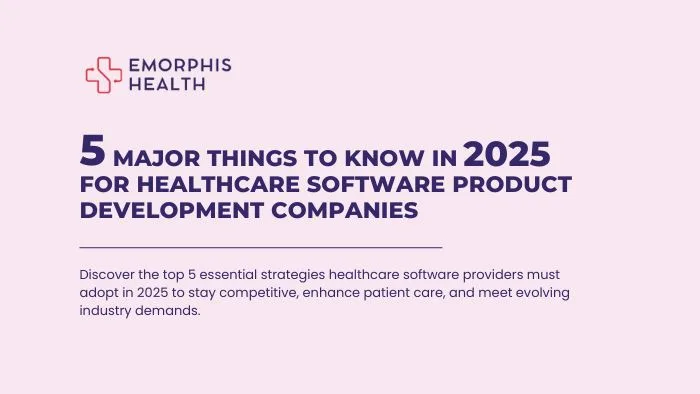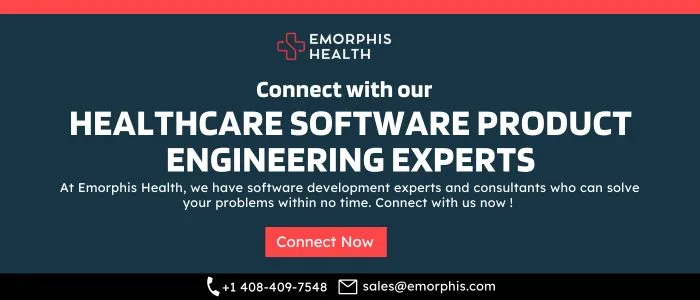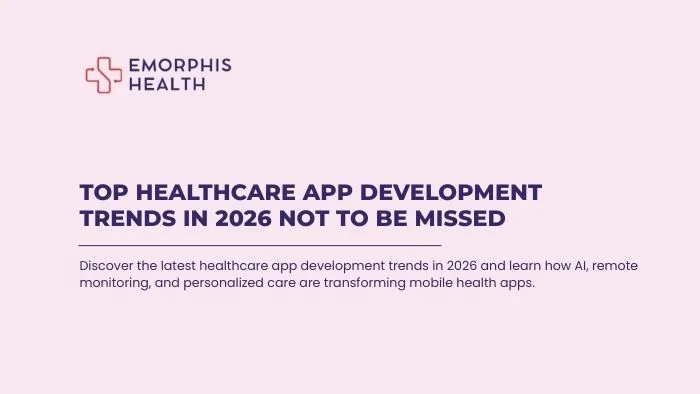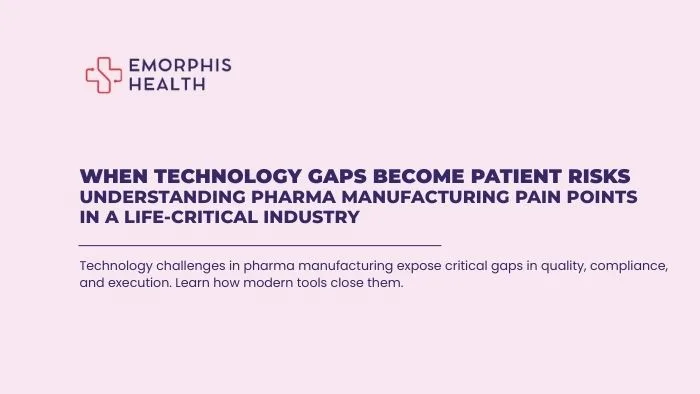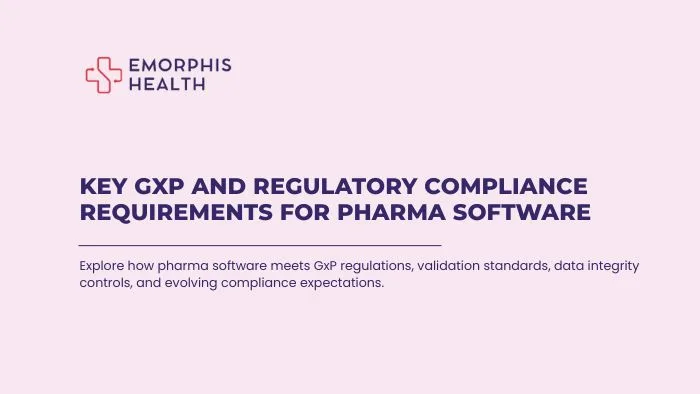What you will find in the article?
See Contents
- 1 What you will find in the article?
- 2 1. Navigating New Regulations and Compliance Challenges
- 3 2. The Rise of Artificial Intelligence and Machine Learning in Healthcare
- 4 3. Emphasis on Cybersecurity: Safeguarding Patient Data
- 5 4. Interoperability and Seamless Integration Across Platforms
- 6 5. Adoption of Remote Healthcare and Telemedicine Solutions
- 7 Conclusion: Future-Proof Your Healthcare Software with Emorphis Health
The healthcare software development landscape is evolving at an unprecedented pace, and 2025 promises to be a year of significant transformation. With regulatory changes, technological advancements, and the increasing need for security and integration, healthcare software providers must ensure they stay ahead of the curve. Healthcare software development is not just about building functional applications—it’s about creating solutions that improve patient care, ensure data security, and align with the ever-changing demands of the healthcare sector.
In this expansive guide, we will explore the five major things healthcare software providers must focus on in 2025, with actionable insights on how you can future-proof your products and make them stand out in the competitive healthcare market.
The Compliance Landscape in 2025
Healthcare software providers are well aware that compliance is not a one-time task but an ongoing responsibility. The ever-evolving nature of healthcare regulations, such as HIPAA (Health Insurance Portability and Accountability Act), GDPR (General Data Protection Regulation), and the latest standards like FHIR (Fast Healthcare Interoperability Resources), means that developers must stay vigilant to ensure that their products meet the latest regulatory requirements.
In 2025, there will be a sharper focus on data protection, particularly around electronic health records (EHRs) and telemedicine solutions. The increasing emphasis on patient privacy and data security is directly linked to the growing use of cloud-based solutions, mobile apps, and the sharing of health data between systems.
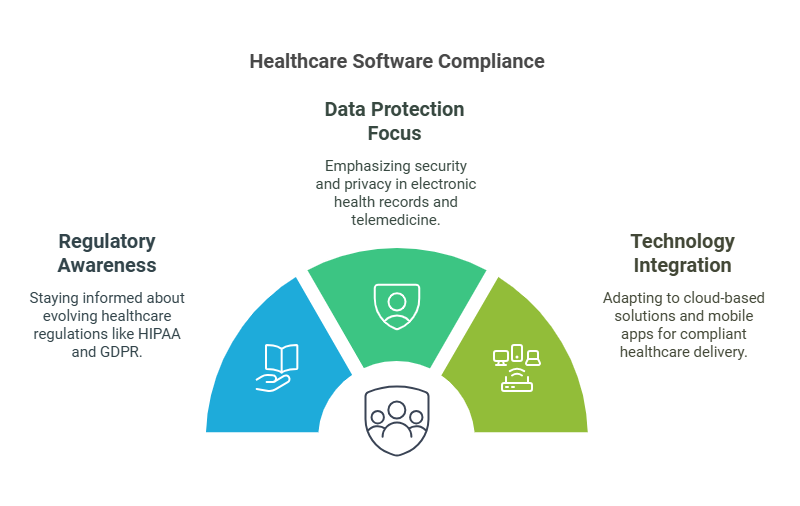

Why it Matters
Non-compliance can lead to substantial fines, legal repercussions, and a loss of trust. Healthcare software providers who neglect regulatory compliance expose their organizations to serious risks, including the erosion of patient trust and credibility in the market. In an industry where privacy and security are paramount, maintaining up-to-date knowledge of regulatory changes is not just a legal requirement but a strategic business advantage.
Find the complete details on understanding healthcare compliance.
Emorphis Health understands the complexities of healthcare compliance. Our team is skilled in implementing the latest regulatory frameworks to ensure your healthcare software products are fully compliant with HIPAA, GDPR, and FHIR. With Emorphis Health, healthcare software providers can rest assured that their products are compliant from day one, minimizing the risk of non-compliance and ensuring patient data remains protected at all times.
2. The Rise of Artificial Intelligence and Machine Learning in Healthcare
AI and ML: The Future of Healthcare Solutions
Artificial Intelligence (AI) and Machine Learning (ML) are reshaping healthcare software development in profound ways. From predictive analytics to patient diagnosis and personalized treatment, AI and ML are powering the next generation of healthcare solutions. Healthcare software providers in 2025 must harness the power of these technologies to enhance clinical decision-making, automate routine tasks, and provide deeper insights into patient health.
AI and ML can significantly improve clinical workflows, optimize resource allocation, and enhance overall patient care. For instance, AI can analyze vast amounts of patient data to identify trends and predict potential health issues before they become critical, enabling preventive care. ML algorithms, on the other hand, can continuously improve the accuracy of diagnostic tools by learning from new data, thus enhancing healthcare outcomes.
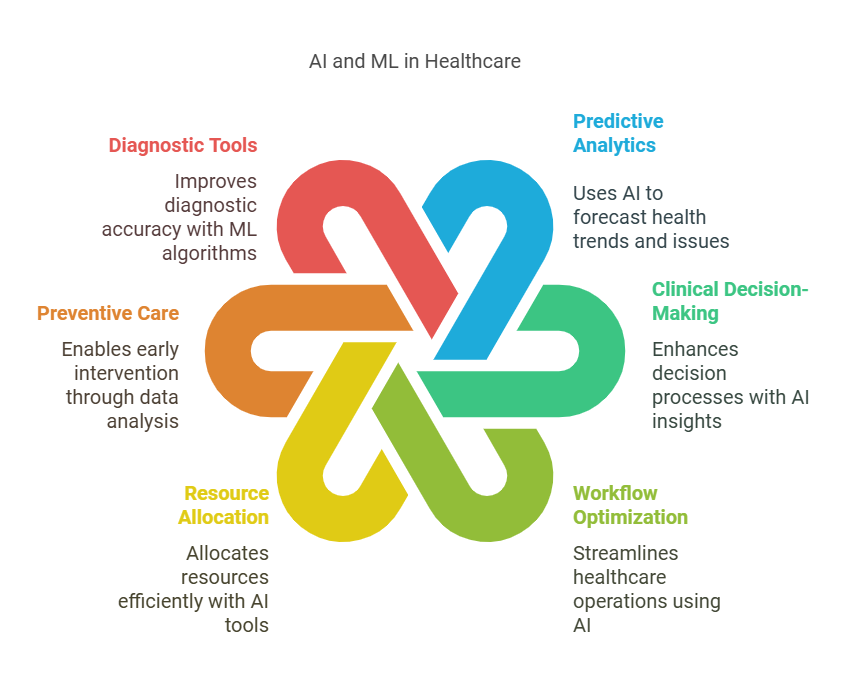

Why it Matters
Healthcare software providers that don’t integrate AI and ML into their solutions risk falling behind. These technologies enable faster, more accurate diagnoses, improved patient outcomes, and more efficient resource management. As AI and ML become integral to healthcare, companies that fail to innovate in this space may struggle to remain competitive.
Read more on AI in healthcare.
At Emorphis Health, we specialize in building AI and ML-powered healthcare solutions. Whether you’re looking to integrate predictive analytics for patient care or develop intelligent chatbots for customer service, we provide end-to-end AI and ML capabilities that empower healthcare software providers. We help you leverage AI and ML to transform your product offerings, making them more efficient, intelligent, and future-ready.
3. Emphasis on Cybersecurity: Safeguarding Patient Data
The Growing Threat of Cybersecurity Risks in Healthcare
In 2025, cybersecurity will continue to be a critical issue for healthcare software providers. With the increasing digitalization of healthcare systems, including EHRs, patient portals, telemedicine platforms, and wearable devices, the healthcare industry is becoming a prime target for cybercriminals. Patient data is extremely valuable, and as the use of electronic health records (EHRs) and remote monitoring solutions expands, so does the potential for data breaches.
Ransomware attacks, phishing scams, and unauthorized access to sensitive data are some of the most common threats facing healthcare systems today. The cost of a data breach can be staggering—not only in terms of fines but also in terms of reputation and patient trust. Healthcare software providers must adopt robust cybersecurity measures to safeguard patient information.
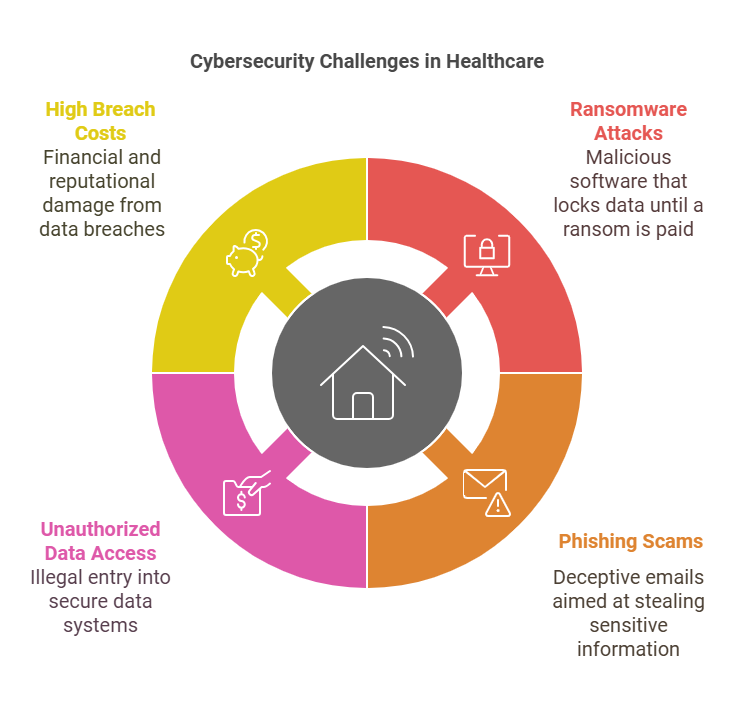

Why it Matters
With healthcare data breaches on the rise, patient trust is at risk. Healthcare software providers must ensure their solutions are secure from the ground up. A breach can result in loss of patient trust, financial penalties, and severe operational disruption. Furthermore, as more healthcare organizations move toward cloud-based infrastructure, cybersecurity will be even more critical in safeguarding sensitive information across decentralized platforms.
Further, click the link to read details on healthcare cybersecurity.
Emorphis Health provides robust cybersecurity measures for healthcare software. From end-to-end encryption to multi-factor authentication and regular vulnerability assessments, we ensure that your software is secure against the latest threats. We work with healthcare software providers to integrate best-in-class security features, helping to protect patient data and ensure the integrity of your healthcare systems.
4. Interoperability and Seamless Integration Across Platforms
The Need for Interoperability in Healthcare Software
In 2025, interoperability will be a top priority for healthcare software providers. As the healthcare ecosystem becomes more interconnected, the ability of different healthcare systems to communicate and exchange data seamlessly is crucial. This includes integrating Electronic Health Records (EHRs), remote monitoring systems, wearable devices, and health information exchanges (HIEs).
Healthcare providers are increasingly relying on a multitude of software platforms to manage patient care, and interoperability ensures that these platforms can exchange data efficiently and accurately. Healthcare software providers must design their products with interoperability in mind, using standardized protocols like HL7, FHIR, and CCD to ensure smooth data sharing between systems.
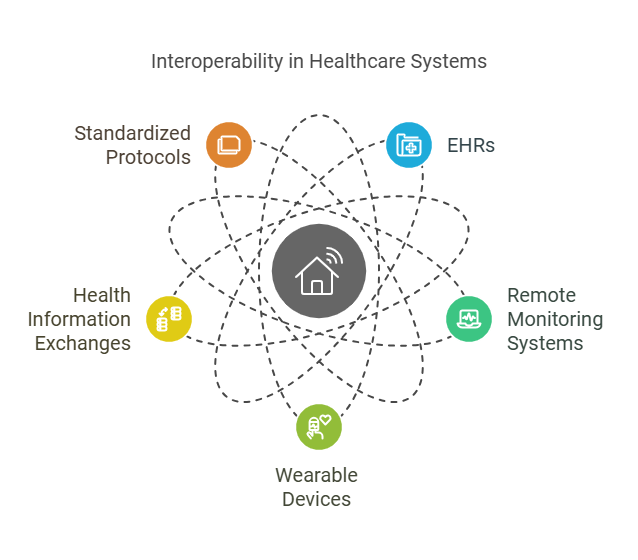

Why it Matters
Healthcare systems that operate in silos can result in inefficiencies, errors, and missed opportunities for patient care. Without interoperability, healthcare providers struggle to deliver comprehensive care that accounts for all aspects of a patient’s health. For healthcare software providers, failing to prioritize interoperability can result in products that are incompatible with other systems, reducing their value in the marketplace.
Find details on healthcare interoperability.
Emorphis Health specializes in creating interoperable healthcare software. By utilizing industry standards and protocols, we ensure that your software can communicate seamlessly with other platforms, including EHRs, HIEs, and third-party applications. Our solutions promote collaboration across healthcare providers, improving patient care and streamlining clinical workflows.
5. Adoption of Remote Healthcare and Telemedicine Solutions
The Rise of Telemedicine and Remote Healthcare
Remote healthcare and telemedicine solutions have surged in popularity over the past few years, and 2025 will see this trend continue. The COVID-19 pandemic has fundamentally changed how healthcare is delivered, and telemedicine is now an essential part of healthcare delivery. Patients are increasingly seeking virtual consultations, remote monitoring, and telehealth solutions that allow them to access care from the comfort of their homes.
Healthcare software providers must integrate telemedicine capabilities into their products to stay relevant. Features such as secure video consultations, real-time health monitoring, appointment scheduling, and secure messaging are critical to delivering effective remote healthcare services.
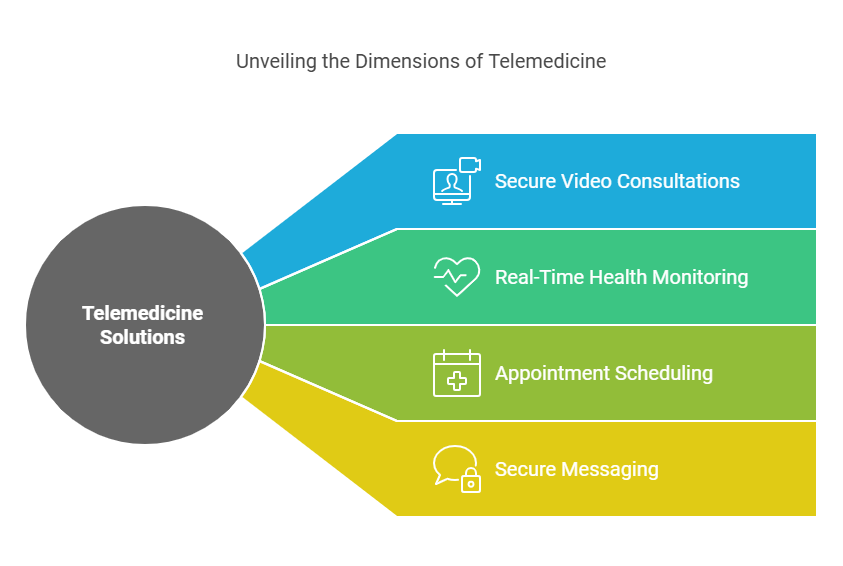

Why it Matters
Telemedicine is no longer optional—patients expect it. Healthcare software providers who fail to incorporate remote healthcare solutions risk alienating their user base. Telemedicine is not only convenient for patients but also helps healthcare systems reduce operational costs and increase accessibility.
Find details of Telemedicine app development solutions.
Emorphis Health offers end-to-end telemedicine solutions that are secure, user-friendly, and scalable. Whether you need to develop video consultation tools, remote patient monitoring systems, or patient portals, Emorphis Health can help you integrate telemedicine features seamlessly into your healthcare software products.
Conclusion: Future-Proof Your Healthcare Software with Emorphis Health
As healthcare software providers, it’s essential to stay on top of the latest trends and challenges in the industry. From regulatory compliance and AI integration to cybersecurity and telemedicine, these key areas are shaping the future of healthcare software. By neglecting these developments, you risk falling behind competitors and missing out on opportunities to innovate and improve patient care.
Emorphis Health is here to guide healthcare software providers through these challenges. With our expertise in compliance, AI, cybersecurity, interoperability, and telemedicine, we help you develop cutting-edge healthcare solutions that meet the needs of the modern healthcare landscape. Don’t let these critical developments pass you by—partner with Emorphis Health to stay ahead and ensure your products are future-ready.
Contact us today and let’s build the next generation of healthcare software together!

